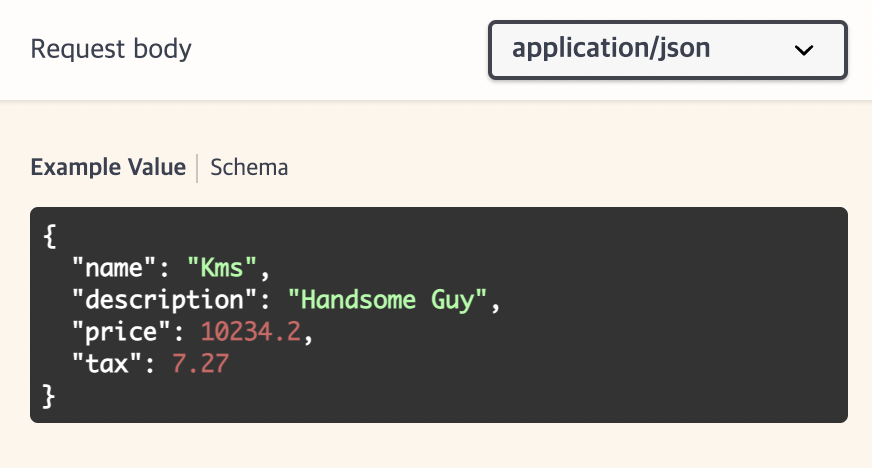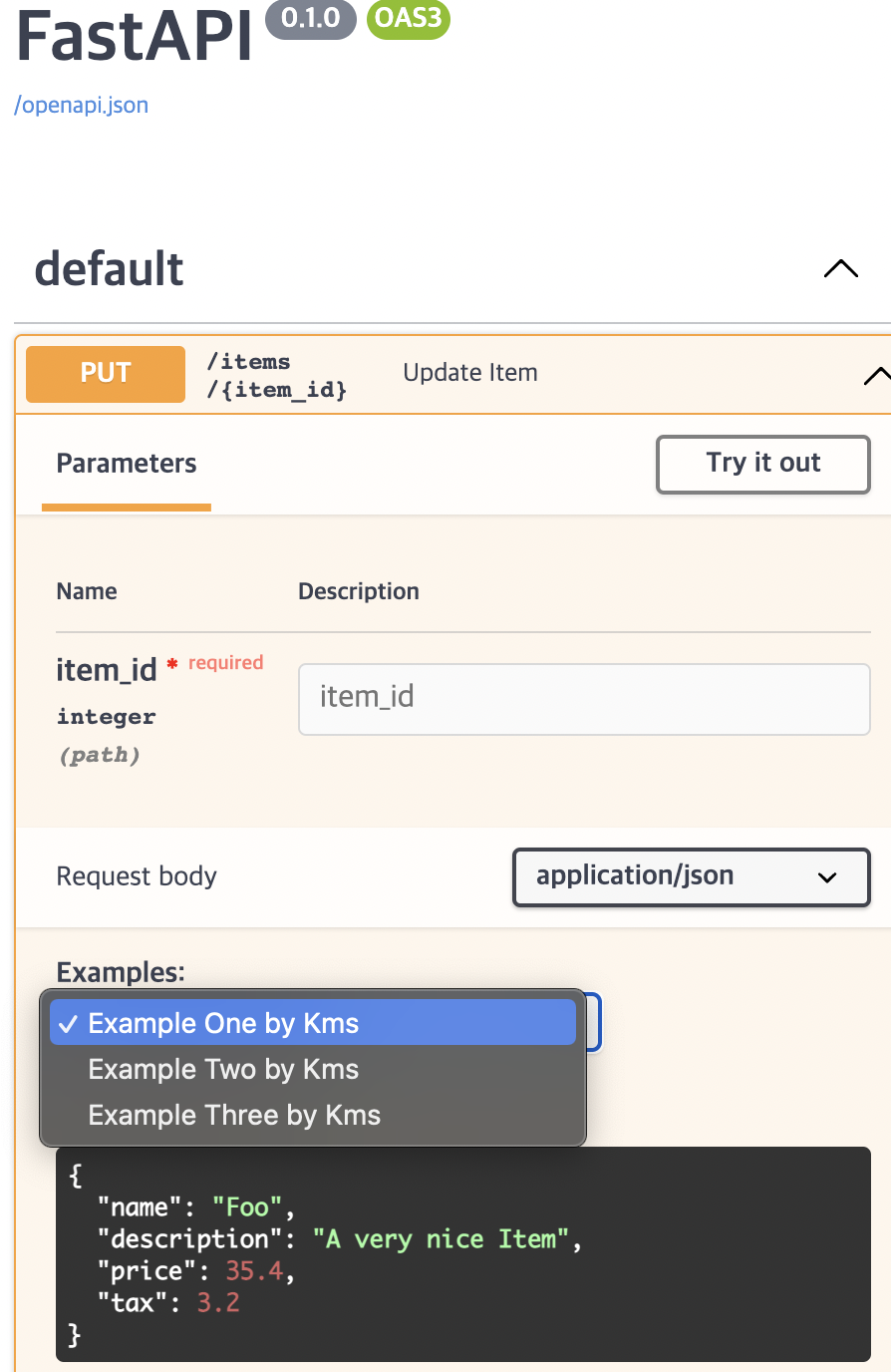FastAPI 공식문서 따라하기[12] - Declare Request Example Data
https://fastapi.tiangolo.com/tutorial/schema-extra-example/ 공식문서 따라하는 글
☑️ Declare Request Example Data
임의로 데이터를 만들어서 요청을 받을 수 있다.
☑️ Pydantic schema_extra
Pydantic모델의 Config와 schema_extra를 사용해서 더미데이터를 만들 수 있다.
1
2
3
4
5
6
7
8
9
10
11
12
13
14
15
16
17
18
19
20
21
22
23
24
25
26
27
from fastapi import FastAPI
from pydantic import BaseModel
app = FastAPI()
class Item(BaseModel):
name: str
description: str | None = None
price: float
tax: float | None = None
class Config:
schema_extra = {
"example": {
"name": "kms",
"description": "kms is handsome",
"price": 10000.0,
"tax": 0.2
}
}
@app.put("/items/{item_id}")
async def update_item(item_id: int, item: Item):
results = {"item_id": item_id, "item": item}
return results
extra는 JSON Schema형태의 값을 만들어내고 Swagger와 같은 docs에서 확인할 수 있다.
exmaple이라는 것을 그대로 명시해야한다. 저 변수명(?)은 사용자가 임의로 조작하면 더미 데이터인지를 인지하지 못한다.
☑️ Field additional arguments
Field()를 사용하면 위에서처럼 더미데이터를 만들 수 있다.
1
2
3
4
5
6
7
8
9
10
11
12
13
14
15
16
17
from fastapi import FastAPI
from pydantic import BaseModel,Field
app = FastAPI()
class Item(BaseModel):
name: str = Field(example="Kms")
description: str | None = Field(default = None, example="Kms is Handsome guy")
price: float = Field(example=10000.5)
tax: float | None = Field(default = None, example= 0.5)
@app.put("/items/{item_id}")
async def update_item(item_id: int, item: Item):
results = {"item_id": item_id, "item": item}
return results
이러한 값들은 유효성을 추가하는것이 아니고, 더미데이터라는 정보만 전달한다. 즉, 문서화의 목적으로 사용하는 것이다.
☑️ example and examples in OpenAPI
Path()Query()Header()Cookie()Body()Form()File()
을 통해서 exmaples이나 example을 선언할 수 있다고 한다.
Body를 사용한 example 코드이다.
1
2
3
4
5
6
7
8
9
10
11
12
13
14
15
16
17
18
19
20
21
22
23
24
25
26
27
28
from fastapi import Body, FastAPI
from pydantic import BaseModel
app = FastAPI()
class Item(BaseModel):
name: str
description: str | None = None
price: float
tax: float | None = None
@app.put("/items/{item_id}")
async def update_item(
item_id: int,
item: Item = Body(
example={
"name": "Foo",
"description": "A very nice Item",
"price": 35.4,
"tax": 3.2,
},
),
):
results = {"item_id": item_id, "item": item}
return results
1
TypeError: Body() missing 1 required positional argument: 'default'
에러가 뜬다.
TypeError: Body() missing 1 required positional argument: ‘default’ 해결법
사실 다음 도큐문서를 보면 바로 나오는데, Body(default = ~)로 쓰면 바로 해결된다.
1
2
3
4
5
6
7
8
9
10
11
12
13
14
15
16
17
18
19
20
21
22
23
24
25
26
27
28
from fastapi import Body, FastAPI
from pydantic import BaseModel
app = FastAPI()
class Item(BaseModel):
name: str
description: str | None = None
price: float
tax: float | None = None
@app.put("/items/{item_id}")
async def update_item(
item_id: int,
item: Item = Body(
default={
"name": "Kms",
"description": "Handsome Guy",
"price": 10234.2,
"tax": 7.27,
},
),
):
results = {"item_id": item_id, "item": item}
return results
즉 example={}를 default={}로 바꾸면 된다.
또는
1
2
3
4
5
6
7
8
9
item: Item = Body(
default={},
example={
"name": "Kms",
"description": "Handsome Guy",
"price": 10234.2,
"tax": 7.27,
},
),
default={}를 선언하고, example에 값을 넣으면 된다.
고로 다시 진행하겠다.
☑️ Body with multiple examples
dict형태로 여러개의 더미데이터를 생성할 수 있다.
또한 추가적인 기능을 가지고 있는데,
summary: 더미데이터의 설명description: 더미데이터의 설명이지만 길 때,Markdown문법도 지원한다.value: 실제로 보여줄 더미데이터 값externalValue:value와 달리,URL을 가르킨다는데.. 그리고value와 달리 많은 도구들에서 지원하지는 않는다고 함.
1
2
3
4
5
6
7
8
9
10
11
12
13
14
15
16
17
18
19
20
21
22
23
24
25
26
27
28
29
30
31
32
33
34
35
36
37
38
39
40
41
42
43
44
45
46
47
48
49
50
51
from fastapi import Body, FastAPI
from pydantic import BaseModel
app = FastAPI()
class Item(BaseModel):
name: str
description: str | None = None
price: float
tax: float | None = None
@app.put("/items/{item_id}")
async def update_item(
*,
item_id: int,
item: Item = Body(
default={},
examples={
"kms_Example1": {
"summary": "Example One by Kms",
"description": "A **normal** item works correctly.",
"value": {
"name": "Foo",
"description": "A very nice Item",
"price": 35.4,
"tax": 3.2,
},
},
"kms_Example2": {
"summary": "Example Two by Kms",
"description": "FastAPI can convert price `strings` to actual `numbers` automatically",
"value": {
"name": "Bar",
"price": "35.4",
},
},
"kms_Example3": {
"summary": "Example Three by Kms",
"value": {
"name": "Baz",
"price": "thirty five point four",
},
},
},
),
):
results = {"item_id": item_id, "item": item}
return results
공식 문서와 예제가 좀 다른데, 마찬가지로 body의 첫 파라미터는 무조건 default를 인자로 넣어줘야한다해서 내가 임의로 바꿔보았다. 실행하면 잘 된다.
description에MarkDown문법을 사용할 수 있다.



